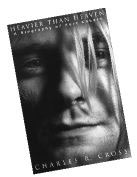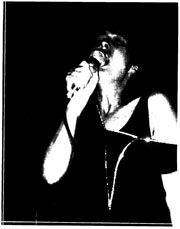HEAVIER THAN HEAVEN BY CHARLES R. CROSS (HYPERION, $24.95)
Elliott Bay Book Company, 101 S. Main, 624-6600 7:30 p.m. Sat., Aug. 18
LOADS OF Nirvana fans clutch myths about St. Kurt as dearly as the devoted grasp rosaries. It makes sense: Nirvana’s music marked many lives as irreversibly as a hand in drying cement.
The chief misperception of believers is that St. Kurt’s was a pure life manipulated—by wife and Hole leader Courtney Love, by an evil music industry, or by some conspiracy that will ultimately reveal his 1994 suicide to be a murder. St. Kurt was a cherub who ventured from the streets of Aberdeen to become king of the rock world, disseminating grunge music while innocently ingesting heroin.
Kurt Cobain, to be sure, was physically and mentally tortured. He was also a purposeful creator manipulated by no one, as former Rocket editor Charles R. Cross makes plain in his insightful, painstakingly researched biography Heavier Than Heaven.
There are myths, certainly, but as Cross points out, the most influential rock artist of the 1990s was the architect of many of them. There’s his first concert, which he claimed was Black Flag (rather than the embarrassingly uncool Sammy Hagar), and the righteous tale of how he pawned his stepfather’s guns for his first guitar (he’d actually owned the instrument for three years already when the guns were sold).
And there’s the oft-told story of how he lived under Aberdeen’s Young Street Bridge after his mother kicked him out at age 17, a scenario that became the basis for “Something in the Way.” In actuality, he drifted from a refrigerator box to apartment hallways and, eventually, to Grays Harbor Community Hospital, where he and a friend pretended they were loved ones of the dying.
“He actually spent some nights, at least, hiding out in the hospital he was born in, pretending to be an aggrieved relative,” Cross says. “That is really unbelievable. You couldn’t make something like that up. And it’s an even more complicated story than living under a bridge. So in some sense I can see why Kurt changed the circumstances of his life. Even if the story he was telling was a dark one, it wasn’t exactly his dark one. In speaking [about] your own level of abuse or pain or hurt or shame, I have found, in [my] years as a journalist, that it’s easier to talk about someone else’s shame than your own. I think that’s why that myth developed.”
Cross waded through 400 interviews over four years to write Heavier Than Heaven. Unlike Michael Azerrad’s Come As You Are, this book was written without authorization or permission from the Cobain camp. A few key voices are missing as primary sources: Kurt’s mom Wendy Cobain; Nirvana drummer Dave Grohl; former Bikini Kill drummer and ex-girlfriend Tobi Vail. But the number of folks Cross did interview is impressive, including Courtney Love; Kurt’s father, grandfather, aunt, and sister; Nirvana bassist Krist Novoselic; and scores of other family members, childhood friends, bandmates, musicians, employees, associates, scenesters, and drug dealers.
And, essentially, Kurt himself, from beyond the grave. The most intriguing insight here is what Cross (and therefore the reader) gleans from 30 Cobain journals. Most of them Cross studied at the invitation of Love, who had only scanned them herself (and not even all of them, at that). Some of the entries are undeniably poetic, even in their darkness.
Some entries are simply devastating. “God damn, Jesus fucking Christ Almighty, love me, me, me, we could go on a trial basis, please I don’t care if it’s the out-of-the-in crowd, I just need a crowd, a gang, a reason to smile. . . .” he writes in early 1993. “I’m so tired of crying and dreaming, I’m soo soo alone. Isn’t there anyone out there? Please help me. HELP ME!”
“There were even some lines in there that were written as if he were writing to a future biographer,” Cross says. “He actually said something: ‘When you tell the story, tell it right. Tell it like this.’ “
Cross’ rendering of Cobain’s childhood and family history is fascinating; his depiction of Cobain’s final hours pulls the reader in opposite directions. As the end of a life, the suicide is especially depressing for its careful planning. As a piece of investigative journalism, Cross’ work is riveting.
Heavier Than Heaven‘s chief draw- back is the dearth of specific information about the creation of the Nevermind (1991) and In Utero (1993) albums. Cross—who previously penned the slim volume Nevermind: the Classic Album—comes across as taking it for granted that Cobain is a genius creator, rather than making the case for such a distinction.
Nonetheless, this is an expert telling of a hellish life. Kurt Cobain did not fall into despair at the end of his days; he lived almost two decades of his 27 years there. He chose—quite consciously, as his journals reveal—to be a heroin addict (and well in advance of his unwieldy fame).
It’s impossible to read Heavier Than Heaven without becoming incredibly sad. But it’s a truthful sadness, and that, in its odd way, is a tremendous gift to those who love Kurt Cobain’s artistry.








